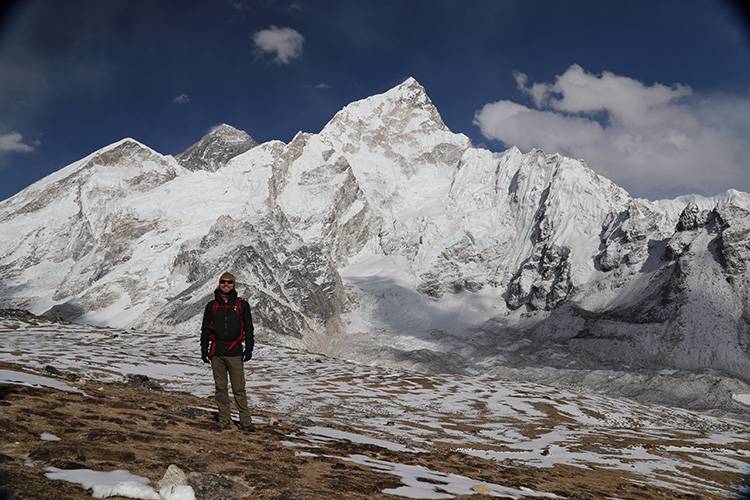PA Practices Mountain Medicine in Nepal
Lifelong Outdoor Enthusiast Tackles Acute Mountain Sickness
January 21, 2020
By Mike Gumpert, PA-C
I wanted to become a PA because I believe the PA profession fills an important need in the healthcare system. PAs increase access to high-quality care, especially in rural and underserved areas. I also liked that there are opportunities to develop and shape the profession, since it is relatively young. The PA profession also offers me a unique opportunity to combine my interest in healthcare with another lifelong passion – outdoor activities like hiking, backpacking, and climbing.
Outdoor enthusiast
I’ve been interested in the outdoors since I was a Cub Scout. As an avid backpacker and hiker, I have come across fellow outdoor enthusiasts of all levels of experience suffering from Acute Mountain Sickness (AMS) on multiple occasions. These situations have given me an appreciation for the insidious and non-discriminatory nature of altitude pathology and the importance of having the necessary knowledge, equipment, and humility necessary to safely explore the high-altitude alpine environment. I was really excited when I learned that my PA program, through the Carilion Clinic Wilderness Medicine Fellowship, offered a high-altitude medicine course, where I could learn more about wilderness medicine concepts such as improvised care and optimizing treatment in resource-limited settings like remote environments and disaster areas.
[Skis, Not Scrubs: PAs Serve Patients on the Slopes]
 High-Altitude medicine in Nepal
High-Altitude medicine in Nepal
We didn’t set out for Nepal right away. The course was split into three phases, and the first phase was done prior to arriving in Nepal. We read about altitude physiology, pathology, and pharmacology and prepared two journal articles related to altitude medicine for presentation on the trail.
We then left for Kathmandu. There, we focused on sustainable global health and provided wilderness first aid training to local groups in partnership with local non-profit organizations. These groups included all-girls elementary school classes, local medical school classes, and a group of local mountain guides, some of whom had already summitted Mount Everest! These classes were largely scenario based and allowed us to reinforce our readings and identification of AMS symptoms with practical skills such as litter carries, tourniquet use and improvised splinting. In addition to the teaching, we also focused on the more intricate aspects of trekking in the alpine, to include route planning to account for elevation changes, packing essentials for personal and group needs, and the identification and treatment of altitude pathology in a remote environment.
The most exciting part of the course was the two weeks we trekked from Lukla to the Mount Everest Base Camp. We spent the days trekking, and the evenings doing journal clubs, discussing interprofessional applications (our group included physicians, PAs, NPs, and paramedics), acclimating to altitude and recording data points such as the amount of oxygen in the blood (SpO2), and heart rate for symptom correlation and analysis. We also had a portable ultrasound with us that we used to measure optic nerve size and to evaluate for pulmonary edema.
Nepal is a beautiful country with friendly people, beautiful mountains, and a rich culture. I am already trying to figure out when I can go back!
[Wanderlust Lessons: Advice from Travel Medicine PAs]
Future plans
I graduated from PA school in December 2019, and commissioned into the U.S. Navy. I intend to use the skills I learned in Nepal during my next job practicing family medicine at the Marine Corps Mountain Warfare Training center in Bridgeport, California. I plan to stay involved in the wilderness medicine community, teaching other providers and outdoor enthusiasts the principles of altitude medicine to improve general knowledge and safety for people exploring our beautiful alpine environments. I hope to earn my diploma in mountain medicine one day, and I want to be an instructor and trek leader for wilderness leadership courses. I’m not sure where my career will lead after the Navy, but I’m excited about all the potential paths being a PA has to offer.
Mike Gumpert graduated from Radford University Carilion PA program in December 2019 and will be practicing family medicine in Bridgeport, California. He can be reached at [email protected].
You May Also Like
How a Helicopter Crew Chief and Bioterrorism Expert Ended Up a PA
International Rotations Expand Opportunities for PA Students
Wanderlust Lessons: Advice from Travel Medicine PAs
Skis, Not Scrubs: PAs Serve Patients on the Slopes
Thank you for reading AAPA’s News Central
You have 2 articles left this month. Create a free account to read more stories, or become a member for more access to exclusive benefits! Already have an account? Log in.



